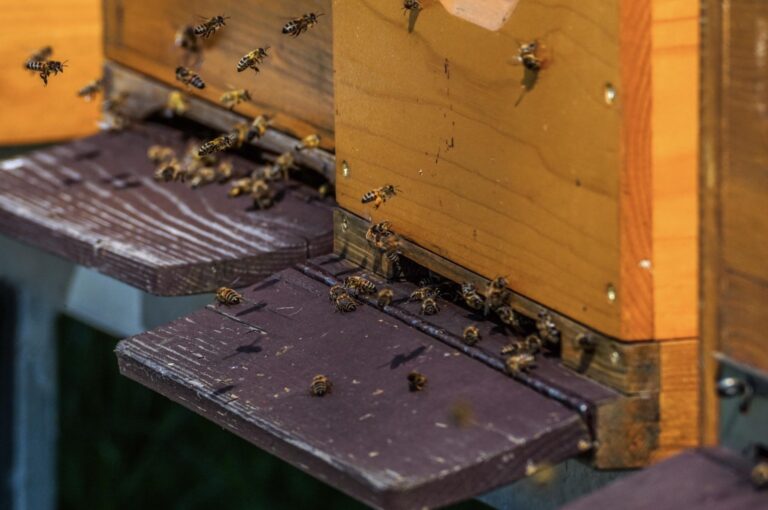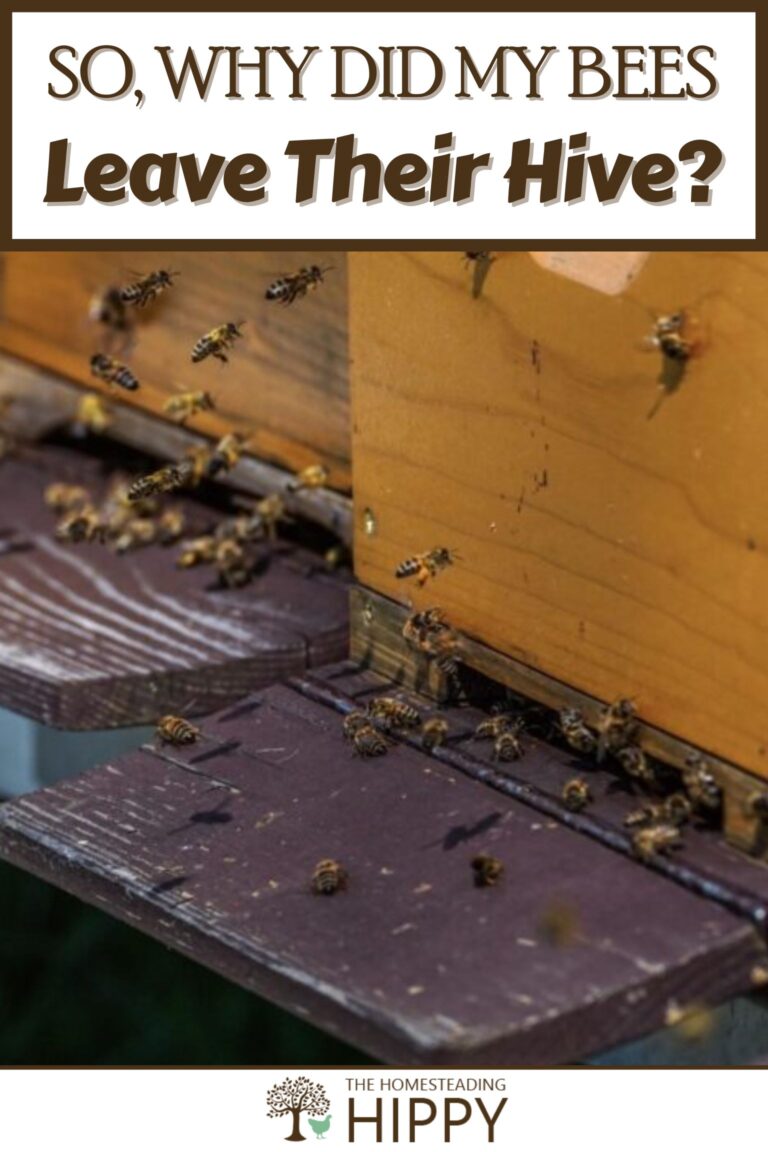Keeping bees is a rewarding pastime and can even be a profitable business, both worthy endeavors in their own right. But many keepers will also admit to having a certain amount of affection for their bees.

Yeah, they are just insects, but it can be a heartwarming thing to see them prosper and triumph with a little help from us.
And that means it can be heartbreaking when you suit up and head out to your hives one fine day only to discover that most or your entire colony has fled their hive.
It feels like a punch in the gut! But why would your bees decide to just up and leave the hive?
Bees might leave their hive for any number of reasons, including colony collapse disorder, climate issues, excess moisture, attacks by predators, disease, high winds, lack of food, overcrowding, and chemical contamination.
There is not much to do but start investigating. It is not out of the question that your bees might come back, but in any case, you’ll want to zero in on the issue to perhaps keep your other colonies in place, safe and sound.
Keep reading and we will tell you more about the most common reasons why your bees might flee the hive.
Table of Contents
1. Colony Collapse Disorder
Colony collapse disorder (CCD) is a phenomenon in which a hive’s bees suddenly disappear.
The causes of CCD are not fully understood, but some possible explanations include interactions of pesticides, pathogens, parasites, malnutrition, and other stressors.
This is a serious problem for beekeepers around the world, one that is on the rise, as it can lead to significant losses in honey production and pollination services.
If you suspect that CCD may be the reason your bees have left their hive, there is not much you can do, sadly. The best course of action is to report the incident to your local beekeeping association and/or agricultural extension office.
2. Climate – Too Hot or Cold
Just like you have a preferred temperature range in your home, bees have a preferred range in theirs.
If their hive gets too hot or too cold, they may decide to leave in search of more comfortable digs.
This isn’t about comfort alone: too hot or too cold and larvae might die off, and even adult bees will be affected. As colony production slows down the continuation of the hive is threatened.
The ideal temperature for a beehive is around 95 degrees Fahrenheit. If the temperature inside the hive goes above 105 degrees, the bees will start to fan their wings to try and cool things down.
Providing their own AC, if you will. If it gets much hotter than that and stays that way they will likely abandon the hive.
On the other hand, if the temperature inside the hive drops below 57 degrees, the bees will start to cluster together to generate heat and stay alive.
If it gets colder than that they stop flying altogether, and may die off or decide to leave when it warms up in search of more seasonal temps.
You can take steps to help regulate the temperature inside the hive by providing insulation, ventilation, and shade as required. So long as you don’t live in an area with an extreme climate your bees will be pretty happy much of the time.
3. Too Much Moisture
Bees need water to survive, obviously, but too much moisture can be a problem, and very particularly if the hive is situated in an area with poor drainage.
If there is too much moisture in the hive it can lead to mold and mildew, which can damage the beeswax comb and even kill the bees outright.
Though drainage is rarely an issue in well-sited and properly constructed hives, you should take care to ensure that moisture is not collecting anywhere inside the hive.
If you see any signs of condensation or water droplets on the inside of the hive, take steps to improve ventilation and/or drainage, and pay close attention during periods of intense precipitation or sustained high humidity.
4. Predator Attack
Bees have plenty of predators in the wild, all kinds in fact. From skunks and bears to small mammals like weasels, badgers, and raccoons, and even other insects like wasps, bees have to contend with a lot of would-be hive raiders.
Whether they want honey, larvae, wax, or the bees themselves, plenty of critters will break into the hive, sometimes destructively.
When this happens, bees will naturally become stressed and respond to the intruder if they can. Some intruders can dispatch or drive off, others cannot.
If enough intrusions happen or if the hive is seriously damaged in an attack, the queen might decide to quite literally bug out and search for a new hive site to start over. This is particularly likely if she is young and has a few years of laying left in her.
If you live in an area with large predators, it’s a good idea to take steps to protect your hives, such as erecting a fence or placing other obstacles to keep them safe and out of reach. Should you notice evidence of smaller predators, you’ll need to tailor your response to them.
5. Disease
Bees, like any other living creature, are susceptible to disease. There are a number of diseases that can decimate a hive, and if enough bees die off or the function of the hive is reduced enough the queen may decide to leave (if she still lives) in an attempt to start over with a new colony that is disease free.
The most common and devastating bee diseases are American Foulbrood (AFB), European Foulbrood (EFB), and Nosema.
These diseases are all highly contagious and often fatal, and if your hive becomes infected it is likely that the entire population will be wiped out. If not, it is highly likely your bees will evacuate.
6. High Winds
Everyone knows bees fly, but what most don’t consider is that bees have to contend with high winds.
They are surprisingly resourceful, modifying flight paths and taking advantage of windbreaks to beat high winds and make it out and back again.
But sometimes bees that have their hive subjected to sustained high winds might decide to relocate to an area with a bit more cover.
Note that individual bees don’t seem to mind anything but the most pronounced wind, say 30 mph plus, but a hive that is exposed to that kind of wind might lead to the queen calling it quits at that location.
Consider the use of windbreaks around a hive to give your bees a little extra protection if you live in a windy place.
7. Lack of Food
Bees need food to survive, obviously, but they also need a certain amount of honey stored up in the hive to make it through winter.
If for some reason the bees are unable to store enough honey, or if they deplete their stores too quickly due to a population boom or other factor, they may decide to leave in search of a more bountiful area.
This is unlikely to be a problem for a well-sited hive, one you have ensured has plenty of resources nearby, but you never know what might happen.
Disease, development, and other mishaps might deprive bees of their usual food sources…
Bees will fly for many miles to locate food, and bring it back, but the longer they have to fly means a higher likelihood of relocation.
8. Overcrowding
Bees are social creatures that live in large hives with countless others, but sometimes a hive can just get too crowded. When this happens the bees may decide to part ways and start a new colony.
This is what leads to swarming activity, where one group of bees leaves the hive with the queen to start afresh elsewhere, and the remaining bees will try to raise a new queen and stay put.
While swarming might seem like a bad thing, it’s actually a very natural process for bees and helps to ensure the survival of the species.
If your hive begins to swarm, don’t panic! It’s not necessarily a sign that something is wrong, and it does not mean that your hive will die out, but you will have to take steps to ensure that the new colony stabilizes and is able to survive on its own.
9. Chemicals
Bees are very sensitive creatures, and even trace amounts of certain chemicals can be harmful or fatal to them.
If you use any kind of pesticide, herbicide, or other chemicals around your hive, or if there are any such products being used in the nearby area, it could result in your bees becoming disrupted and leaving.
There is still much we do not know about the interactions of all kinds of chemicals and chemical byproducts with bees, in the air, land, and water. We do know one thing, though, less is always better!

Tom has built and remodeled homes, generated his own electricity, grown his own food and more, all in quest of remaining as independent of society as possible. Now he shares his experiences and hard-earned lessons with readers around the country.
Find out more about the team here.
